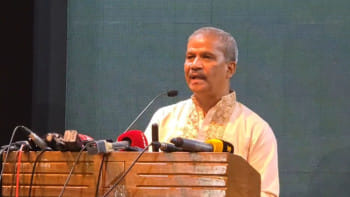Cut emission level by 45pc within 2020
The most vulnerable countries (MVCs) demanded the developed countries to reduce their emission by 45 percent in aggregate against 1990 levels by 2020 and make available fund of $150 billion a year to help protect the victims.
Civil society representatives from the MVCs made the call at a three-day international civil society conference on the rights of the most vulnerable countries in climate negotiations ended at Dhaka Sheraton Hotel here yesterday with a 'Dhaka Declaration.'
They also demanded that annex 1 Parties (developed nations) must reduce their emission by at least 45 percent in aggregate against 1990 levels by 2020.
They also made a call to all parties to the UN Framework Convention on Climate Change (UNFCCC) to reach such an agreement at the 15th conference of parties (COP15) in December in Copenhagen so that the global greenhouse gas emissions must peak no later than 2015 as it is a question of survival for people.
At the conference, they also demanded to reduce the global greenhouse gas emissions by at least 95 percent below 1990 levels by 2050.
"We urge all Parties to the UNFCCC to ensure that an agreement is reached at COP15 to ensure our continued survival," the Dhaka declaration stated.
"Adapting to climate change is not a choice, it is a necessity," it added.
Ziaul Hoque Mukta of the Campaign for Sustainable Development in Bangladesh read out the declaration at a press meet held following the conference.
He said of the $150 billion a year requested for developing countries, $50 billion a year should be targeted for adaptation projects in the MVCs and it should not take the form of loans.
Dr Saleemul Huq, senior fellow of UK-based Institute for Environment and Development, said civil society in vulnerable countries have to ensure their own governments struck the best deal in the upcoming climate meet in Copenhagen.
"We need to provide assistance. What is not yet agreed is how much money is involved, figures range from $50 billion to $100 billion," said Huq.
The conference was jointly organised by the Campaign for Sustainable Rural Livelihoods and Oxfam.
Civil society representatives from the Maldives, Nepal, Bhutan, Vietnam, Cambodia, Ethiopia, Uganda, Lesotho, Swaziland, Zambia, Niger, Tanzania, Samoa, Thailand, Sri Lanka and the Philippines attended the conference.

 For all latest news, follow The Daily Star's Google News channel.
For all latest news, follow The Daily Star's Google News channel. 



Comments